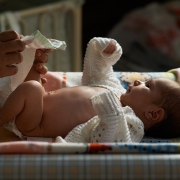
Breastmilk and formula provide all the nutrients a child requires during the first months of life. The introduction of solid foods must be individualized to a child’s needs. It is recommended that solids be initiated between four and six months of age when readiness cues are seen (such as watching you eat intently or grabbing … Continue reading “Eating Solid Foods”

Breastfed infants may normally have frequent, loose stools which can sometimes be confused with diarrhea. Diarrhea in children is watery and may occur 10-12 times a day. Treatment of diarrhea consists primarily of giving the baby adequate fluids while continuing the child’s regular diet. If your baby needs extra fluids, give Pedialyte, not water. Call … Continue reading “Diarrhea”

A diaper rash usually consists of redness or small bumps on the lower abdomen and diaper area that have direct contact with the soiled diaper. A rash of this type is rarely serious and usually clears in three or four days. For care: keep the skin clean and dry apply a diaper rash ointment or … Continue reading “Diaper Rash”

Crying gives your baby a way to call for help when hungry, cold, or uncomfortable. Fussy periods often increase in length and intensity during the first six weeks of life and then gradually decrease, usually disappearing by four months of age. When your baby cries, try to meet the most pressing needs first. If nothing … Continue reading “Colic & Shaken Baby Syndrome”

The use of car seats appropriate for each child’s age and size helps to maximize automobile safety. Infants and toddlers should ride in a rear-facing seat until they are at least 2 years of age or reach the highest weight or height allowed by the manufacturer of their car seat. Read More: HealthyChildren.org HighwaySafety – … Continue reading “Car Seats”